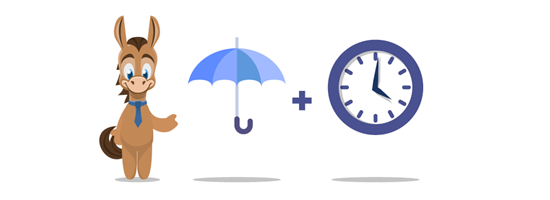What Is Term Insurance and How Does It Work?
Is term life insurance the always the most affordable? And is the coverage any good? Read on for average rates and policy comparisons for term life insurance.
 |
| © CreditDonkey |
What Is Term Insurance?
 |
| © CreditDonkey |
Term life insurance is the least expensive type of life insurance.
You pick a term length, pay the premiums, and the beneficiary receives the death benefit if you die during the term.
If you don't die during the term, the policy will usually just expire. But there are convertible or renewable options if you still need insurance.
When you buy term insurance, you choose the:
- Length of the term
- Death benefit (what you leave to the beneficiary)
- End-of-term options (convertible or renewable)
It's best to choose an affordable, convertible policy with enough death benefit to provide for your family's needs. If your budget is tight, it's better to shorten the term than reduce the death benefit.
Who Should Buy Term Insurance
Most families have financial obligations that might go unpaid once one source of income is gone. If there are periods of time when your family's financial stability would be most threatened by the loss of your income, a term right policy may be a good choice
Consider opting for a term that might cover costs during the following times:
- Before your children become self-sufficient
- While paying a hefty mortgage
- Recovering from the premature death of a parent
Which is better, Term or Whole life insurance?
Depends on your needs. Below, we outline the major differences between term and whole life insurance. For a more in-depth comparison, check out our article here.
| Term Policy | Whole Policy | |
|---|---|---|
| Coverage | 10-30 years | Entire life |
| Rates | Less expensive | More expensive |
| Premiums | Usually fixed | Usually fixed |
| Cash Value | Does not accumulate value | Accumulates Value |
| Coverage | Only at death | For life |
| Applying is... | Less complicated | More complicated |
Pros of Term Insurance
- Simple to Understand
There aren't many moving parts. Just pick the coverage amount and the length of the term. - Affordable
It's not expensive to buy a high amount of coverage. A healthy 30-year-old man can buy a 30-year-term with $500,000 coverage for as low as $35/month. - Flexible
Conversion options make term insurance a surprisingly flexible option.
As mentioned above, conversion is a good option to extend coverage if you happen to outlive your term. Just be sure to understand how conversion may change your premiums.
Cons of Term Life Insurance
- Coverage is Temporary
You're only covered for the length of your term, which most people outlive. If this is a concern, consider whole life or guaranteed universal life instead. - Renewing Comes with Higher Premiums
If you outlive your contract and still have insurance needs, you'll have to renew, but this time at a higher premium. You'll be older and may have more health issues, so it'll likely be more expensive. - No Investment Portion
If you outlive your contract, it expires. To some people, it can seem like a waste to have paid into for multiple years.
Types of Term Insurance
 |
| © CreditDonkey |
You pick a term length when you buy the policy. During the term, the policy will maintain the same premium. The basic rule is that the longer the term, the higher the premium.
- Annual Renewable Term
An Annual Renewable Term (ART) will be the lowest cost option initially, but the premium renews at a higher rate. ART is a good choice when you're not sure how long you'll need coverage for. - 10/20/30-Year Term
These are the most common term lengths available. Your current financial situation and family needs will dictate which term is best for you.- 10-year: The least expensive option. This can be a good choice if you have a tight budget or expect your income to be higher in 10 years.
- 20-year: Great for a complete family (after all children are born). By the end of the term, the children will be grown and less insurance will be needed.
- 30-year: A good choice if you have just taken out a 30-year mortgage and want insurance to cover it.
- Decreasing Term
Your death benefit declines as your loan balance declines. This way, you aren't paying for more insurance than you need. This can be a good choice if you want insurance to pay off debt or a mortgage, and it's usually a cheaper option. - Renewable Term
This allows you to renew without going through underwriting, though with higher rates. Policies usually renew for a specific term, such as 5 years. This is good if you only need coverage for a short period of time but want the option to extend it. - Simplified Issue
With simplified issue, you don't need to take the medical exam, so it's easier to get, but more expensive. This is only a good choice if you think you won't pass the exam or won't qualify for a low premium. - Convertible Term
This allows your term policy to be converted to permanent without re-evaluating your health. This is a good choice if you experience changes in health, start a risky hobby, or want permanent insurance later on but can't afford the premiums.Keep in mind, if you qualify for a new policy at good rates, you won't use the conversion feature.
Difference between Term and Whole Life
- Whole life insurance lasts for your entire life:
As long as you keep paying the premium, the insurance company will provide a payout upon your death, no matter when you die. - Whole life policies have a cash value component
This is similar to a savings account. The amount grows as premiums are paid and you can borrow from it if needed. If you terminate the policy, you get the cash value amount. At age 100, the cash value will equal the death benefit. - Whole life insurance can be costly
For a $500,000 death benefit, the monthly premium for a healthy 30-year-old man could be $400/month. That's over 10x the cost of term insurance. - Usually only needed for special circumstances
Most people don't need whole life. Usually it's for situations such as:- If you need to pay estate taxes
- To fund business buy/sell agreements
- To provide for a special needs child
- If you need to pay estate taxes
If you want to save or invest money, it's better to just buy term and invest the difference separately. Qualified retirement accounts provide the opportunity for deferred growth of your savings and investments.
Difference between Term and Universal Life
Universal life offers more flexibility, but is more complicated.
- Universal life has variable cash values
Cash values vary based on the interest rate declared by the insurance company, so this can offer better returns than whole life policies when interest rates are high. But cash values are not guaranteed. - The annual premium is flexible
You can pay flexible premium amounts (to a certain extent). If you have enough cash value, you can even use it to pay the premium. But the insurance company can increase premiums if interest rates are low. - You get more of a choice
You can choose how much of the premium you want to go into the death benefit and how much to go into cash value.
Don't make the mistake of underfunding (which causes the cash value build-up to be too low) or skipping payments. Be mindful of how low interest rates might negatively affecting your cash value, and the company's ability to increase the premium.
Term Life Insurance Companies
 |
| © CreditDonkey |
There are a lot of term life insurance companies to choose from. To help your search, we've put together a few top companies you may want to consider. Read on for some of the top life insurance companies.
Best for No Medical Exam: Haven Life
Haven Life only offers term life policies and their application process takes place online.
Depending on your health, you may qualify for their InstantTerm process. If so, no medical exam is required, and full coverage can begin immediately.
A.M. Best rating: A++
Best for Seniors: Transamerica
Transamerica provides quality coverage and aims to increase the health and wellness of their policyholders. They offer educational resources and wellness services.
They offer term coverage up to $10M, as well as competitive rates for seniors over 71. Their accelerated death benefit allows you to use some of your payout to medical bills should you become chronically ill.
A.M. Best rating: A+
Best for Young Adults: AIG
AIG offers term life insurance policies for terms between 10 and 30 years, in increments of 5 years. They're known for having a simple and straightforward application process.
Their most popular life insurance product is the Level Term policy for young adults. Premiums remain fixed through the term, a perfect choice for young adults who may not be as financially stable.
A.M. Best rating: A
Best for Smokers: Banner Life
Smokers often pay as much as three times the rate of non-smokers for life insurance. Banner is among the few companies that cater to smokers by offering affordable rates and a special rating class.
While they do require a medical exam to get life insurance, they may not decline you or charge you sky-high premiums just because you smoke. They also offer discounted policies to young adults and those who are health conscious.
A.M. Best rating: AA-
When shopping for life insurance, be sure to get quotes from multiple companies. Read on for average rates for term life insurance.
Term Life Insurance Rates by Age
To give you an idea of what you might be paying for term life insurance, we've gathered average rates for a 30-year term. Rates are based on healthy, non-smoking men and women.
30-Year Term Rates - Male
| Age | $100,000 | $250,000 | $500,000 | $1,000,000 |
|---|---|---|---|---|
| 20 | $12.96 | $20.53 | $33.06 | $55.00 |
| 30 | $13.31 | $21.62 | $34.28 | $61.77 |
| 40 | $20.52 | $31.18 | $55.26 | $103.53 |
| 50 | $39.78 | $74.94 | $138.99 | $258.39 |
| 60 | $251.83 | $213.67 | N/A | N/A |
30-Year Term Rates - Female
| Age | $100,000 | $250,000 | $500,000 | $1,000,000 |
|---|---|---|---|---|
| 20 | $11.92 | $18.49 | $26.97 | $46.72 |
| 30 | $12.88 | $19.45 | $28.62 | $51.03 |
| 40 | $18.15 | $27.61 | $45.51 | $83.09 |
| 50 | $31.94 | $59.64 | $102.66 | $194.95 |
| 60 | $251.83 | $90.50 | N/A | N/A |
Common Mistakes to Avoid
Be careful of these common mistakes when buying term life insurance.
- Multiple policies when one will do
Some agents encourage you to buy more than one policy, like getting a $500,000 policy for ten years and another $500,000 policy for twenty years.However, every term insurance policy has a flat rate "policy fee" of $50 or more included into the premium rates, which offsets a lot of the difference between ten- and twenty-year rates. Compare both options.
- Overpaying for simplified issue
Simplified issue policies don't require a medical exam. However, it's more expensive. This is only a good move when you are worried something discovered during the process will increase your rates.If you're worried about this, buy a simplified issue policy so you have coverage quickly. Then, apply for a fully underwritten policy. If you're able to obtain the underwritten policy at a lower rate, cancel the simplified issue policy and keep the less expensive coverage.
- Not using an independent agent
Independent agents have access to many multiple companies with different rates, areas of specialty, and conversion options. The areas of specialty are critical if you have a health issue, occupation, or hobby that makes qualifying for good rates difficult.
How to Find the Best Term Life Policy
 |
| © CreditDonkey |
Buying life insurance is a big decision that requires research. Make sure you're buying the best policy for you and your family by considering these factors first:
Q: How long should my term be?
A: Your term should cover you until debts are paid, dependents are financially independent, and retirement is near. Read here for more.
Q: How much coverage do I need?
A: Enough to replace your income, pay off debts and fund college education, if needed. Catch up here.
Q: What happens if my health changes?
A: Your life insurance provider cannot change you policy if your health changes during your policy. However, when initially applying, it's crucial to be upfront about any health conditions.
Q: What isn't covered?
A: Murder by beneficiary or death from illegal activities isn't covered. If the policyholder dies by suicide, it's covered only after the 2-year contestability period. Read more here.
Q: Is there a grace period if I miss a payment?
A: Most companies have a 30-day grace period. If you do not pay during the grace period, your coverage stops.
Q: How financially sound is the insurer?
A: Check the company's A.M. Best rating. You'll want a company rated BBB or higher.
Bottom Line
Term insurance is an inexpensive way to provide for your family if something were to happen to you. It's the best choice for most families because it's simple and affordable.
Pick a term that would cover the length of your major financial obligations (like a mortgage). Remember to ask questions and understand your policy before you buy.
Write to Jeanine J at feedback@creditdonkey.com. Follow us on Twitter and Facebook for our latest posts.
Note: This website is made possible through financial relationships with some of the products and services mentioned on this site. We may receive compensation if you shop through links in our content. You do not have to use our links, but you help support CreditDonkey if you do.
|
|
|











